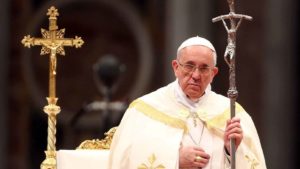

Robert Spencer – March 8, 2022
Is the pope Catholic?
It used to be the epitome of a question for which the answer was obvious, but in the days of Pope Francis, it’s hard to tell anymore. The present occupant of the Chair of St. Peter has given many people cause to wonder if a more revealing question would be, “Is the Pope Marxist?” Recently, Pope Francis issued a curious warning against the dangers of hybrid Marxist Catholic theology. The Spanish-language Argentine edition of Aleteia reported that, in a letter to the Santa Maria Spirituality Center in Buenos Aires, the Pontiff warned against “the ideologizing of a Marxist tint of some Latin American centers in the ‘70s.” The pope’s rejection of Marxism, however, is nominal and inconsistent.
Pope Francis stunned opponents of the idea of an economy controlled by government fiat when he wrote in his 2020 encyclical Fratelli Tutti: “The marketplace, by itself, cannot resolve every problem, however much we are asked to believe this dogma of neoliberal faith. Whatever the challenge, this impoverished and repetitive school of thought always offers the same recipes. Neoliberalism simply reproduces itself by resorting to the magic theories of ‘spillover’ or ‘trickle’ – without using the name – as the only solution to societal problems.”
Actually, the name “trickle-down economics” is indeed used by critics of the view that those who innovate, create, and provide employment opportunities for others should be penalized for doing so.
The pope went even farther in the same encyclical, giving justification to state confiscation of the bank accounts and possessions of dissidents by stating that “the Christian tradition has never recognized the right to private property as absolute or inviolable, and has stressed the social purpose of all forms of private property.”
Instead, he continued, “the principle of the common use of created goods is the ‘first principle of the whole ethical and social order’; it is a natural and inherent right that takes priority over others,” which certainly sounds a great deal like Marxism.

